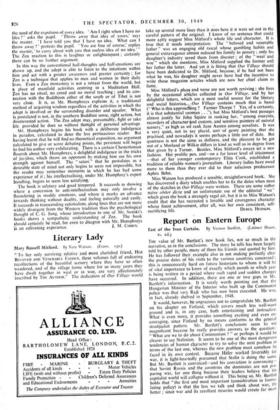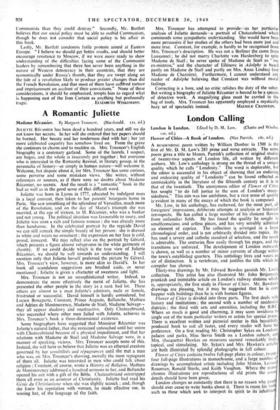Report on Eastern Europe
East of the Iron Curtain. By Vernon Bartlett. (Latimer Mouse.
8s. 6d.)
THE value of Mr. Bartlett's new book lies, not so much in the narrative, as in the conclusions. The story he tells has been largely told by other people, many of them his friends and quoted by him. He has followed their example also in not making perfectly clear the precise dates of his visits to the various countries concerned ; this is unnecessarily hard on future historians to whom it will be of vital importance to know of exactly which month in which year is being written in a period where such rapid and sudden changes have occurred. In addition, there are one or two gaps in Mr. Bartlett's information. It is surely worth pointing out that the Hungarian Minister of the Interior who built up the Communist police was that very Rajk who has now been executed. He was, in fact, already shelved in September, 1948.
It would, however, be ungracious not to congratulate Mr. Bartlett on his chapter on Finland, which covers much less well-worn ground and is, in any case, both entertaining and instructive. What is even more, it provides something exciting and even en- couraging, since Finland by no means conforms to the general straitjacket pattern. Mr. Bartlett's conclusions seem to me magnificent because he really provides answers to the question: " What are we to do about Communism ? " or perhaps it would be clearer to say Stalinism. It seems to be one of the most dangerous tendencies of human character to try to' solve the next problem in terms of the last one, whereas the new problem must somehow be faced in its own context. Because Hitler worked feverishly for war, it is light-heartedly presumed that Stalin is doing the same. But Mr. Bartlett is convinced—and his conviction is convincing— that Soviet Russia and- the countries she dominates are not pre- paring war, for one thing because their leaders believe that the capitalist world will collapse without it. This being so, Mr. Bartlett holds that " the first and most important (consideration in formu- lating policy) is that the less we talk and think about war, the better ; since war and its resultant miseries would create far more
Communists than they could destroy." Secondly, Mr. Bartlett believes that our social policy must be able to outbid Communism, though he does not consider that social policy is his affair in this book.
Lastly, Mr. Bartlett condemns futile protests aimed at Eastern Europe. " I believe we should get better results, and should better encourage resistance to Moscow, if we were more ready to show understanding of the difficulties facing some of the Communist leaders by remembering that there has never been anything in the nature of Western democracy in their countries, that they are economically under Russia's thumb, that they are swept along on the tide of a revolution likely to produce greater changes than did the French Revolution, and that most of them have suffered torture and imprisonment on acciunt of their convictions." None of these considerations, it should be emphasised, tempts him to regard what is happening east of the Iron Curtain as anything but profoundly































 Previous page
Previous page